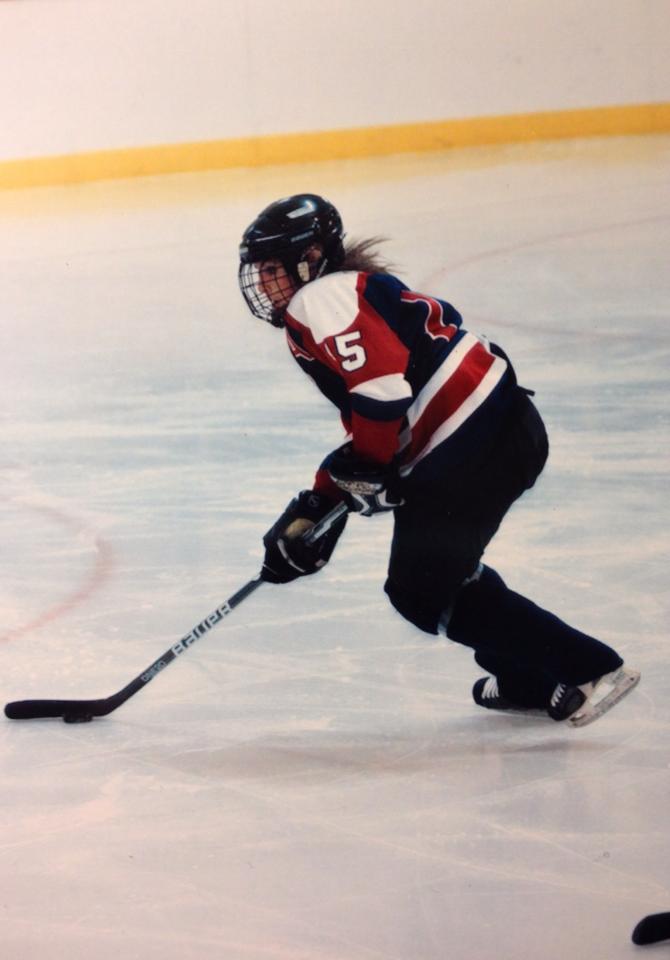by Janet Schultz
 As I’ve come to know hockey players, their coaches, families and supporters; I’ve found many that overcome obstacles to play the sport they love. We’ve all read and seen stories on players who have overcome cancer, diabetes, the passing of a loved one, injury to themselves, financial difficulties and other obstacles and still persevere and put their entire being back out on the ice for the team and the sport.
As I’ve come to know hockey players, their coaches, families and supporters; I’ve found many that overcome obstacles to play the sport they love. We’ve all read and seen stories on players who have overcome cancer, diabetes, the passing of a loved one, injury to themselves, financial difficulties and other obstacles and still persevere and put their entire being back out on the ice for the team and the sport.
Those stories are an inspiration to so many of us, even when we don’t have problems, to continue on.
Well, the enthusiasm and friendly smile of Katie Fish is contagious. Her love of the game and her need to share her hockey with her teams and friends is self evident when you talk to her.
And yet, she has overcome an obstacle that for many of us causes fear–hearing loss. Think about not being able to hear the sounds of the day, let alone the sounds on and off the ice while you try to play your best.
Katie was diagnosed with hearing loss at age four. There was no medical proof she was born with it, yet her parents noticed certain things and a hearing test confirmed that she could not hear.
She was given her first hearing aid at four. She admits she hated preschool because that was a time of great change for this little girl. But through her school career she was mainstreamed into regular classes.
“But I had to sit in front row in every class for my entire time I went to school,” says Katie.
In high school she was assigned an itinerate teacher from Erie 1 BOCES who met with her regularly and she had a FM system that was used by the teacher to enhance her hearing.
“I also read lips,” said Katie.
She also doesn’t want to be left out of anything, which is how she ended up in hockey.
“My little brother played since he was five. Every winter Dad would build an backyard rink and we had sticks, skates, pucks, nets and since I like to do things I learned and played with him,” she explains.
One little item, he’s a left-handed player and had left-handed sticks; that’s what she used. She’s right-handed.
“I didn’t know any different,” she goes on. “But Dad took me out in the driveway and worked with me with both sticks and he told me I was a rightie.”
That was after she had been taken to Amherst Skating Club to learn to skate and also to find out she wasn’t a figure skater, she wanted hockey.
“I played softball in the summer and one of the girls played hockey in the winter and asked me to join,” she remembers.
She tried out in the spring and at age 11 she headed over to play hockey. Too old for House she ended up on the 19U team, where she will tell you she learned lots of things from the older kids, not all hockey!
“I played for the Amherst Knights for 3-4 years, then went to the North Buffalo Thunder Cats for 3-4 years and wound up at the Niagara County Coyotes,” she said.
“I finished my career with the Coyotes and then played for the Wheatfield Blades Senior C women and now play for the Buffalo Regals Senior B women.”
She also played a little club hockey while a student at Canisius and is currently listed as their coach, but there haven’t been enough girls to warrant a team.
“We want girls to know they can play if they attend Canisius and still play for their travel teams.”
Katie is also found behind the bench. Beginning five years ago with the Monsignor Martin team in the inaugural year of the WNYGVIH Federation and then she went to the Buffalo Regals 14U team as an assistant and has stayed with them through their current 19U season.
How does she manage all this if she can’t hear?
First, she does have hearing aids and in a few weeks will receive a free pair of premium level hearing aids from Hearing Evaluation Services (HES). HES held a give-away and Katie’s sister nominated her. It was a public vote and Katie received the most votes.
She has overcome obstacles which were numerous.
First being equipment. Her and her Dad’s first experience in helmet fitting was just that, an experience. The helmets have to fit tight; but a tight fitting helmet would jam her hearing aids into her head–if it could.
“Because of the extent of my loss, I have to have the aids that are behind the ears,” she explains. “Also the padding goes against the ear and caused problems.”
They finally found one that fit but at times the helmet will cover the aid making it difficult to hear.
Fitting isn’t the only problem, moisture from sweat an cover the tube that carries the sound and once again hearing is gone.
“Then there can be times when I forget to change the battery and I remember being in the middle of a play and my hearing is gone,” she explains. “At that point I have to go off the ice and into the locker toom to change it.”
“You can’t just take the tube off and blow the moisture out with a straw,” she goes on. “I have to deal.”
The game itself requires a lot of focus, attention, communication and ability to react quickly.
She manages by making sure she keeps her eye on the puck, head up and always on the swivel and making sure she’s in the front row facing the coach giving instructions.
“As a coach now I make sure all my girls can see me talk,” explained Katie. “The Coaches face you when they are talking but then when they go to use the white board, they end up turning sideways and I have to move to see them.”
She often needed skills and drills to be repeated so she could understand them. She now learns how by not being the first player to try them but rather watches and learns and then does.
“I always like to be first, so this is hard but it’s how I learn,” she remarks.
Now one other hurdle is the officials. When Katie plays no one knows of her hearing loss and that has put her in the penalty box.
“I used to not hear what they called me for and when I asked my voice was amplified due to the hearing loss and they thought I was arguing,” she smiles. “I also would not understand when the referee told us to “square up” at faceoff because they would come out jumbled up to me and I wouldn’t be in the ready position. I would loose faceoffs. Now I just square up and ignore the referee at faceoff.”
While on the ice the roar of the crowd and people screaming at the players come muffled to her; yet the sound of air horns are louder for her than the normal hearing person and can make her jump on the ice.
“The sounds of the hockey arena are different for me and a person with hearing loss has to play the game a little differently,” she goes on. “I play because I love it.”
She also loves coaching, and even pefers that to playing.
What she has with her current team is a group of girls that know about her hearing loss and help her.
“They are rock stars,” she comments. “They are patient, they will repeat what the coach says if I have been at the door or talking to another girl while he gives instructions and they look directly at me when they speak.
“They go above and beyond and helped me set aside any fears I may have had about coaching.”
Katie coaches because she feels strongly that females need female coaches and there aren’t enough out there.
“I’m a sounding board for them and they know they can tell me anything,” she says. “And they also know that if they tell me something that could hurt themselves or others that I will then, and only then, talk to their parents.”
When Katie receives her new hearing aids, she will be more grateful than anyone can know. She explained how overwhelming it was to have received so many votes and how emotional the nomination from her sister was.
Her sister said it best when she explained that “Katie just wears hearing aids. Period. She’s no different than you or me and there is nothing wrong with her–she just has extra accessories” to put on in the morning.







